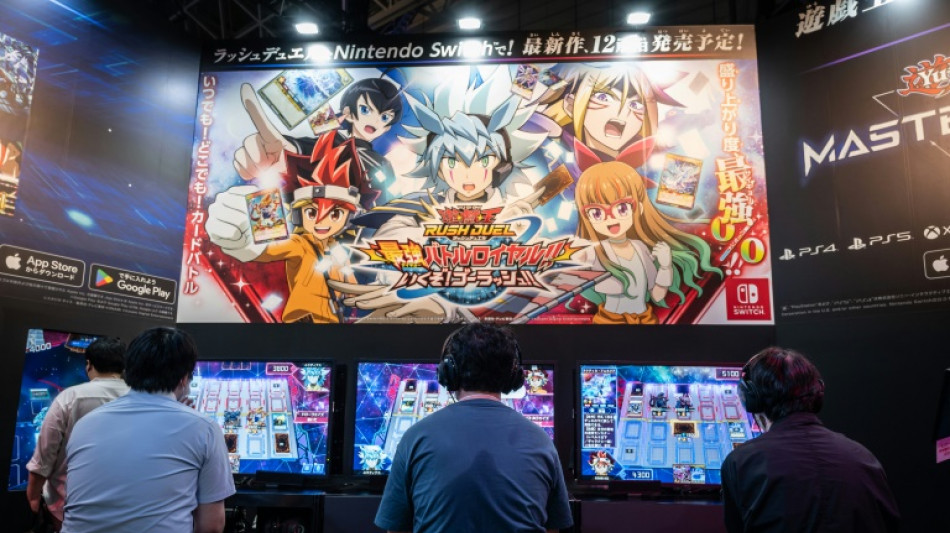
-
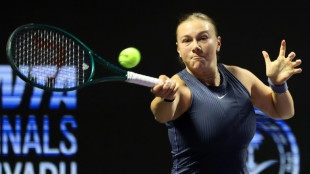 Anisimova beats Swiatek to reach WTA Finals last four
Anisimova beats Swiatek to reach WTA Finals last four
-
US Supreme Court appears skeptical of Trump tariff legality

-
 AC Milan post third straight annual profit on day of San Siro purchase
AC Milan post third straight annual profit on day of San Siro purchase
-
Angelina Jolie visits Ukrainian frontline city, media reports say

-
 UN says forests should form key plank of COP30
UN says forests should form key plank of COP30
-
Star designer Rousteing quits fashion group Balmain

-
 Mexico's Sheinbaum steps up cartel fight after murder of anti-narco mayor
Mexico's Sheinbaum steps up cartel fight after murder of anti-narco mayor
-
Attack on funeral in Sudan's Kordofan region kills 40: UN

-
 Key PSG trio set for spell on sidelines
Key PSG trio set for spell on sidelines
-
Democrats punch back in US elections - and see hope for 2026

-
 BMW reports rising profitability, shares jump
BMW reports rising profitability, shares jump
-
Bolivia Supreme Court orders release of jailed ex-president Jeanine Anez

-
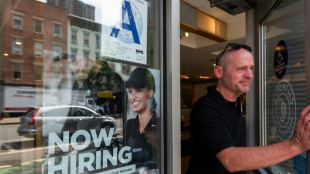 Wall Street stocks rise after positive jobs data
Wall Street stocks rise after positive jobs data
-
'Hostage diplomacy': longstanding Iran tactic presenting dilemma for West

-
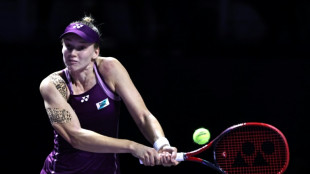 Rybakina stays perfect at WTA Finals with win over alternate Alexandrova
Rybakina stays perfect at WTA Finals with win over alternate Alexandrova
-
Le Garrec welcomes Dupont help in training for Springboks showdown

-
 Brussels wants high-speed rail linking EU capitals by 2040
Brussels wants high-speed rail linking EU capitals by 2040
-
Swiss business chiefs met Trump on tariffs: Bern

-
 Spain's exiled king recounts history, scandals in wistful memoir
Spain's exiled king recounts history, scandals in wistful memoir
-
Wall Street stocks steady after positive jobs data
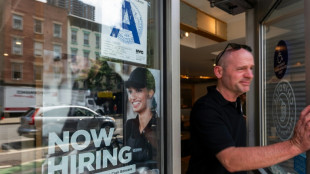
-
 Trump blasts Democrats as government shutdown becomes longest ever
Trump blasts Democrats as government shutdown becomes longest ever
-
Indian pilgrims find 'warm welcome' in Pakistan despite tensions

-
 Inter and AC Milan complete purchase of San Siro
Inter and AC Milan complete purchase of San Siro
-
Swedish authorities inspect worksite conditions at steel startup Stegra

-
 Keys withdraws from WTA Finals with illness
Keys withdraws from WTA Finals with illness
-
Prince Harry says proud to be British despite new life in US

-
 EU strikes last-ditch deal on climate targets as COP30 looms
EU strikes last-ditch deal on climate targets as COP30 looms
-
Stocks retreat as tech bubble fears grow

-
 Shein opens first permanent store amid heavy police presence
Shein opens first permanent store amid heavy police presence
-
West Indies edge New Zealand despite Santner brilliance

-
 French pair released by Iran await return home
French pair released by Iran await return home
-
German factory orders up but outlook still muted

-
 Death toll tops 100 as Philippines digs out after typhoon
Death toll tops 100 as Philippines digs out after typhoon
-
Attack on key city in Sudan's Kordofan region kills 40: UN

-
 'No one could stop it': Sudanese describe mass rapes while fleeing El-Fasher
'No one could stop it': Sudanese describe mass rapes while fleeing El-Fasher
-
Champagne and cheers across New York as Mamdani soars to victory

-
 Medieval tower collapse adds to Italy's workplace toll
Medieval tower collapse adds to Italy's workplace toll
-
BMW boosts profitability despite China, tariff woes

-
 South Africa's Wiese wary of 'hurt' France before re-match
South Africa's Wiese wary of 'hurt' France before re-match
-
Beyond limits: Croatian freediver's breathtaking record

-
 Tottenham supporting Udogie after alleged gun threat in London
Tottenham supporting Udogie after alleged gun threat in London
-
Thunder roll Clippers to stay unbeaten as SGA keeps streak alive

-
 In appeal, Australian mushroom murderer alleges 'miscarriage of justice'
In appeal, Australian mushroom murderer alleges 'miscarriage of justice'
-
Toyota hikes profit forecasts 'despite US tariffs'

-
 Ex-France lock Willemse challenges Meafou to become 'the bully'
Ex-France lock Willemse challenges Meafou to become 'the bully'
-
Ukrainians to honour sporting dead by building country they 'died for': minister

-
 At least 7 dead after UPS cargo plane crashes near Louisville airport
At least 7 dead after UPS cargo plane crashes near Louisville airport
-
US Supreme Court hears challenge to Trump tariff powers

-
 US government shutdown becomes longest in history
US government shutdown becomes longest in history
-
India's Modi readies bellwether poll in poorest state


Video game hub Japan confronts problem of addiction
From Super Mario to Final Fantasy, Japan has long been synonymous with gaming, but some experts and parents fear a growing addiction problem is going unaddressed.
While nearby nations like China and South Korea have imposed drastic restrictions on youth gaming in recent years -- with mixed results -- some Japanese families feel they are being left to deal with the issue on their own.
Each month, a group meets in Tokyo to swap stories and strategies for tackling their children's gaming habits.
"My only comfort is that he has been keeping his promise to stay offline overnight," one father says, as another confides their child has been attending a rehab day camp.
The group's founder, Sakiko Kuroda, says children in Japan now start playing video games early in primary school, and pandemic restrictions mean many are playing for longer.
Many parents do not know how to deal with the issue, and there is "a lack of action by the government and the gaming industry," said Kuroda, who started the group in 2019 as an informal meet-up.
"People come from across the country to take part, as this kind of self-help gathering is rare in Japan."
The World Health Organization describes "gaming disorder" as behaviour that results in "significant impairment" of areas like relationships, education or work, and lasts at least a year.
As gaming can overlap with other online activities like social media use, it is hard to quantify the problem, though anecdotal evidence from doctors suggests more families in Japan are worried -- particularly since the pandemic.
- 'Playing all night' -
An education ministry survey this April showed that 17 percent of children aged six to 12 spend more than four hours a day gaming -- up from nine percent in 2017, with a similar jump seen among those aged 12 to 15.
"Games have clever systems to lure people into continuing to play... including constantly updated apps and virtual money," said Mia Itoshiro, who works with a group that gives seminars on preventing gaming addiction.
"Parents are increasingly consulting us saying 'my children can't go to school because they're tired after playing all night'."
China in November announced it had "solved" youth gaming addiction by limiting the time children can play online games to just three specified hours a week, enforced through facial recognition software and ID registration.
Meanwhile, South Korea last year removed a decade-long ban on PC-based online gaming for children under 16 between midnight and 6:00 am, which local media had branded outdated and ineffective.
Japan has had no similar rules, and even a much-debated 2020 local ordinance that banned under-18s from playing more than an hour on weekdays had no enforcement mechanism.
Parents and experts say gaming can tip into obsessive behaviour in children because of other problems, including Covid-related stress or bullying.
The mother of a 13-year-old girl told AFP that video games became a "lifeline" for her daughter when she was struggling at school.
When she tried to take away the girl's tablet, her daughter, then 10, replied: "If you deprive me of this, I'd want to die."
"I was shocked to hear her say something like that," the mother said.
Others who have experienced gaming addiction also say it became a lifeline for them during times of struggle.
- Underlying problems -
Takahisa Masuda, now a 46-year-old social worker, plunged into gaming as a bullied middle school student, and he believes the escape mechanism saved his life.
"I had thought about killing myself, but I wanted to finish Dragon Quest," Masuda told AFP.
By the time he had, he felt strong enough to face his tormentors, and he committed to his studies, eventually realising his goal of working in the gaming industry.
So, while parents are often inclined to ban gaming or remove devices, Susumu Higuchi, a doctor and director of the Kurihama Medical and Addiction Centre, instead offers children counselling to tackle underlying problems.
His clinic also provides offline activities from art and cooking to sports, intended to open patients up to other hobbies and social situations.
He wants the government and industry to do more to prevent children from becoming addicted in the first place.
"Discussing gaming and online tools requires a balance," Higuchi said.
"But at the moment it seems to me that measures to rein in the negative aspects are dwarfed by the promotion of gaming."
K.Brown--BTB




